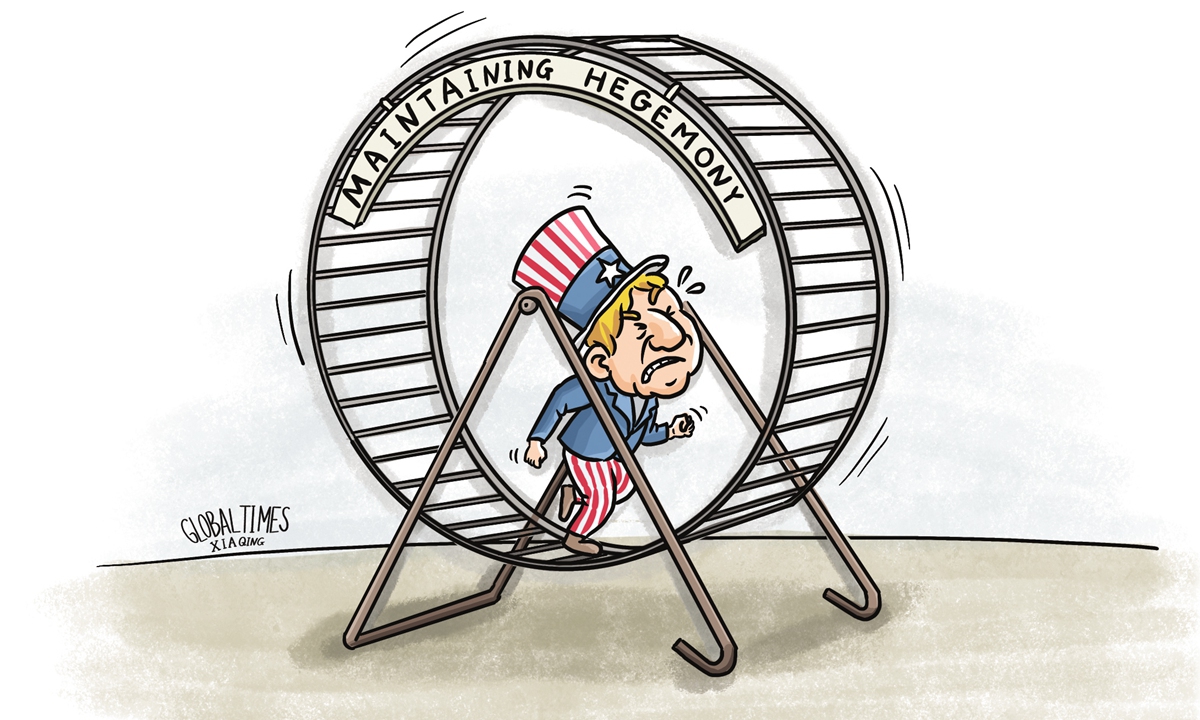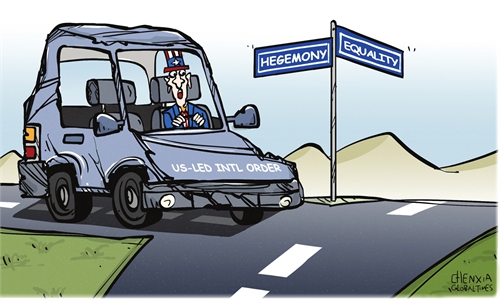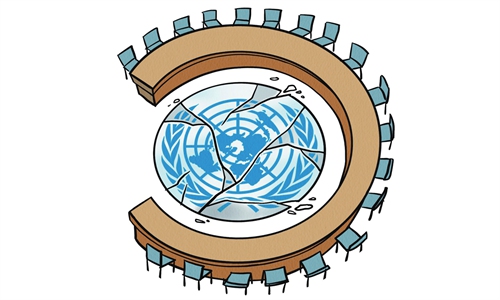
Illustration:Xia Qing/GT
In simple and clear-cut remarks, Malaysian Prime Minister Anwar Ibrahim told the US, Europe and a wider range of the world that the baton of American hegemony is failing - Washington is increasingly incapable of dictating the choices of other countries."Anwar Ibrahim questioned why Malaysia would 'pick a quarrel' with China, its largest trading partner, in response to US criticisms of his country's ties with Beijing," Financial Times (FT) reported on Sunday. "Why must I be tied to one interest? I don't buy into this strong prejudice against China, this China-phobia," he said in an interview with the FT. In the same piece, Anwar is quoted as saying, "We are a small country struggling to survive in a complex world … I want to focus on what is best for us."
The FT was attempting to induce Anwar to toss out an answer that is expected by the West, such as, Malaysia is siding with the US, or at the very least, Malaysian relationship with the US is strong and not influenced by China. Clearly, beyond the West's soap bubble, the world is very different. To be straightforward, it is a proof that more and more countries are not buying into the US hegemony any longer.
Southeast Asia is very close to China and is a key region in the US' "Indo-Pacific Strategy." However, the US faces the greatest difficulty in isolating China in the region. In 2000, US trade with ASEAN was more than three times that of China-ASEAN trade. By 2020, China's trade was almost double that of the US. And today, China has become the largest trading partner of almost all ASEAN countries. Larger economies of ASEAN, including Indonesia, Malaysia, Thailand and Vietnam, are not willing to take sides. All of them hope to leverage the contradictions between China and the US to maximize their own interests.
Against this backdrop, US "Indo-Pacific Strategy" is now being mentioned less frequently by Americans, as it is increasingly clear this strategy is not working, Shen Yi, a professor at Fudan University, told the Global Times.
Ganging up with partners and allies is a vital means for the US to maintain its hegemony. Traditionally, the alpha of a gang is supposed to take the lead when charging forward, while others follow and benefit from it. Yet when it comes to the current US hegemony, Washington pushes others to the forefront, exploiting them while having little to offer.
When tensions between China and the Philippines are escalating in the South China Sea, Manila has been facing warnings of a rice crisis. Has the US done anything to show strong support to the Philippines in this regard? No trace can be found in news coverage.
Malaysia is one of the most "neutral" countries in ASEAN. It has a bitter memory of colonial aggression and the harm caused by the power games during the Cold War, it is thus very averse to great power competition and unwilling to take sides, Chen Xiangmiao, director of the World Navy Research Center at the National Institute for South China Sea Studies, told the Global Times.
Chen added that Anwar is sober toward the consequences of taking sides, which would jeopardize the overall relationship and interests with one of the two major powers, and could lead ASEAN to becoming a vassal state. There are 11 members in the bloc, each country has a different level of relationship with China and the US. Hence the outcome of being coerced to take sides could also likely lead to growing divergences in the region and even the disintegration of ASEAN. From whatever perspective, Anwar embodies a highly pragmatic attitude, protecting the interests of his country and ASEAN, and his remarks represent the mainstream position of ASEAN.
The vast majority of countries make diplomatic decisions based on their own national interests. If the US wants other countries to change their diplomacy, it must show them reasons for gains and losses. In recent years, the US has not ceased putting pressure on ASEAN, which is firmly on the path of neutrality and non-alignment, hoping to bring ASEAN into Washington's camp. But what benefits can the US offer ASEAN?
Remember the US-ASEAN Special Summit in Washington, DC in 2022? Leaders of ASEAN went all the way to the US, to hear the US announce an investment of $150 million for all the ASEAN member countries combined. What a chicken feed. In December 2023, Japanese media outlet The Asahi Shimbun reported that Anwar said that when he visited the US, he was asked why Malaysia is tilting toward China. He replied, "Because they're investing more."
China is committed to common development. It focuses on baking the cake bigger for win-win cooperation and mutual prosperity. Yet the US is busy launching anti-China and anti-Russia campaigns, dividing the world into different camps, disrupting international cooperation, and demanding obedience from other countries, when all others want a peaceful international environment to develop.
The US no longer has the capability to play a dominant global role, in addition, there's no global environment to allow it to do so. Its hegemonic mentality and approaches are outdated. That's why we have witnessed French President Emmanuel Macron openly urging Europe to reduce its dependence on the US; an HSBC executive slamming "weak" UK for backing the US against China; Africa and Latin America emphasizing the rise of the Global South; India, Japan, and South Korea adjusting their distance from China, trying to please the US for their own interests while making sure their ties with China won't deteriorate rapidly to turn themselves into a pure US pawn; and most recently, Anwar's criticism of China-phobia.
Only the feet know if the shoes fit. The US has been persuading other countries that cooperating with China is not the right shoes, but other countries are telling the US now that the shoes fit comfortably, Shen said.
At the same time, the US is left alone, living in its own fantasy of hegemony, talking to itself.


